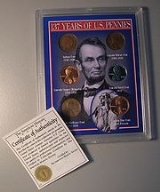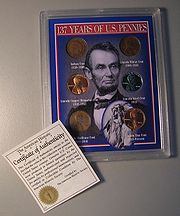
Certificate of Authenticity
Encyclopedia

Computer program
A computer program is a sequence of instructions written to perform a specified task with a computer. A computer requires programs to function, typically executing the program's instructions in a central processor. The program has an executable form that the computer can use directly to execute...
, t-shirt
T-shirt
A T-shirt is a style of shirt. A T-shirt is buttonless and collarless, with short sleeves and frequently a round neck line....
, jersey
Jersey (clothing)
A jersey is an item of knitted clothing, traditionally in wool or cotton, with sleeves, worn as a pullover, as it does not open at the front, unlike a cardigan. It is usually close-fitting and machine knitted in contrast to a guernsey that is more often hand knit with a thicker yarn...
, or any other memorabilia
Souvenir
A souvenir , memento, keepsake or token of remembrance is an object a person acquires for the memories the owner associates with it. The term souvenir brings to mind the mass-produced kitsch that is the main commodity of souvenir and gift shops in many tourist traps around the world...
or art work, especially in the world of computers and sports, it is commonly a seal on paper authenticating a specific art work which and is made to demonstrate that the item is authentic. Computer COAs have a license number on them, which verifies that the program is a genuine, legal copy. Art work or posters come with a certificate of authenticity signed and sealed by a reputable appraiser or auction house.
COAs are mostly common in the art world. Generally speaking, a valid COA for an artwork will include specific details about the artwork like when and how it was produced, the names of people or companies involved in the artwork's production, the work's exact title, the dimensions of the art, and the names of reference books, magazines, or similar resources that contain either specific or related information about either that work of art or the artist. The COA should also state the qualifications and full contact information of the individual or entity that authored the certificate with his or her complete and current contact information. COAs have been a target of much controversy due to online auction sites where sellers are providing fake Certificates of Authenticities to market or sell their art works. The details below identify how to tell the difference and best practices for consumers to identify a real certificate from a fake.

